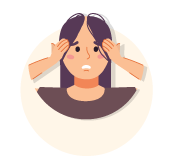Hair loss can be a distressing experience for women, and hormones often play a significant role. Understanding how hormone imbalances contribute to female hair loss is essential for finding effective solutions. In this blog, we’ll explore the connection between hormones and hair loss.
How Hormones Cause Hair Loss
Hormones are chemical messengers that regulate many body functions, including hair growth. Hair goes through growth cycles, and hormones can influence these cycles. When hormone levels fluctuate, it can disrupt these cycles, leading to hair loss. For example, during pregnancy, increased estrogen levels can promote hair growth, but postpartum hormone drops can lead to shedding.
Several key hormones play a role in hair health:
Estrogen
Estrogen is known for promoting hair growth and keeping hair in its growth phase. When estrogen levels are low, hair can become thin and more prone to shedding.
Testosterone and Androgens
While testosterone is typically considered a male hormone, women also have it in smaller amounts. High levels of testosterone and other androgens can shrink hair follicles, leading to a condition called androgenetic alopecia, a common form of female hair loss.
Thyroid Hormones
The thyroid gland produces hormones that regulate metabolism. Both hypothyroidism (low thyroid hormone levels) and hyperthyroidism (high thyroid hormone levels) can cause hair loss, making balanced thyroid function crucial for healthy hair.
Progesterone
Progesterone supports hair health by balancing the effects of estrogen and testosterone. Low levels of progesterone can lead to hair thinning and increased shedding.
Cortisol
Cortisol is known as the stress hormone. High levels of stress and cortisol can disrupt the hair growth cycle, leading to hair loss. Managing stress is important for maintaining healthy hair.
Recognizing Hormone Imbalance Symptoms
Identifying hormone imbalances early can help address hair loss effectively. Common symptoms include:
- Irregular periods
- Weight changes
- Fatigue
- Mood swings
- Changes in hair texture
- Increased hair shedding
- Skin issues
If you notice these symptoms along with hair loss, it might indicate a hormonal imbalance.
Understanding the role of hormones in female hair loss is crucial for finding the right treatment. If you experience symptoms of hormone imbalance and hair loss, it’s important to seek medical advice.


